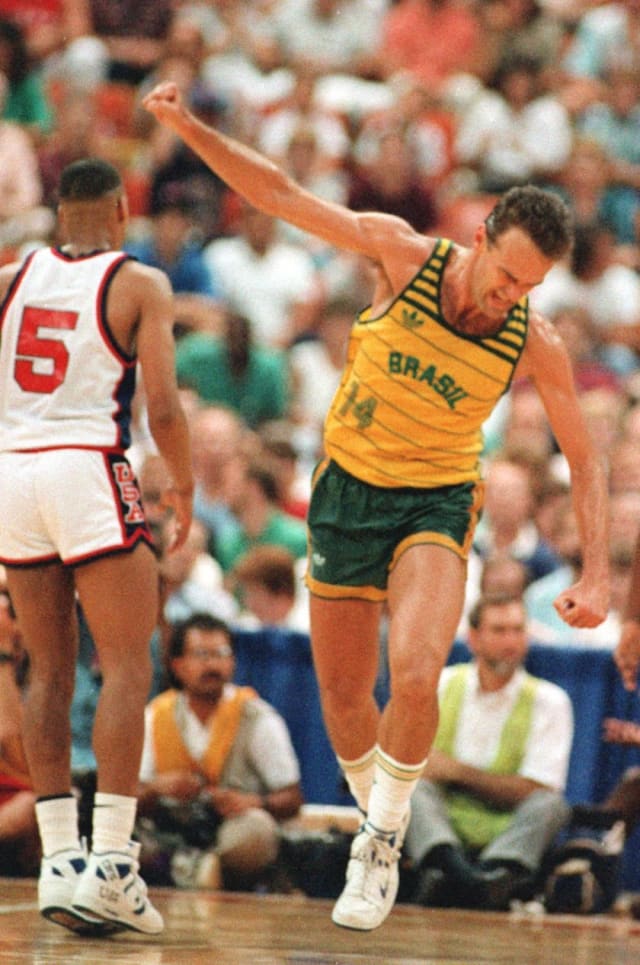Oscar's finest hour - the 46-point eruption to stun the USA
MIES (Switzerland) - The record books do not like, that Brazil legend Oscar Schmidt is the all-time leading scorer in Olympic history with 1,093 points, and that he has a host of other statistics that show
MIES (Switzerland) - The record books do not lie, that Brazil legend Oscar Schmidt is the all-time leading scorer in Olympic history with 1,093 points. There are other statistics that show how special he was in international basketball.
He featured in five Summer Games and four FIBA Basketball World Cups and had some stunning performances, like the Olympic record 55 points he poured in against Spain at the 1988 Seoul Games. Selected in the sixth round of the 1984 NBA Draft, he passed on the chance to play for the New Jersey Nets so he could continue to play for Brazil. In those days, NBA players were not allowed in international competition and Oscar didn't want to forfeit the right to put on his national team jersey.
After a career that saw Oscar inducted to both the FIBA, and the Naismith Memorial Basketball Hall of Fames, one memory of his time as a Brazil national team star ranks number one for him, and most everyone else in his homeland.
In America’s basketball heartland of Indianapolis, Indiana, in the Final of the 1987 Pan American Games, Oscar helped slay the giant. With a sold-out Market Square Arena crowd of 16,408 in attendance, the USA led Brazil in the Final by 20 points but Oscar, who was 29 years old, poured in 35 of his game-high 46 points in the second half and led his team to a 120-115 triumph.
It was a significant result for many reasons. It came just one year after a star-studded USA team that had future NBA players like Davidson Robinson, Steve Kerr, Sean Elliott, Muggsy Bogues, Brian Shaw and Armand Gilliam had won the FIBA Basketball World Cup in Spain. That USA team beat Brazil in the Semi-Finals, 96-80.
The USA's Pan American Games team was stocked with talent too. It had future NBA players Robinson, Willie Anderson, Pooh Richardson, Ricky Berry, Danny Manning, Pervis Ellison and Fennis Dembo, and the player that made the game-winning shot for Indiana in the 1987 NCAA Championship against Syracuse, Keith Smart.
 Oscar celebrated while pouring in a game-high 46 points in the upset of the USA in Indianapolis
Oscar celebrated while pouring in a game-high 46 points in the upset of the USA in Indianapolis
The loss to Brazil in Indianapolis was only the third in Pan American Games history for the USA men and was only the second time since 1951 that the United States had not reached the top of the podium.
It was a very big deal and not just in Brazil. In America, Oscar became a household name for those that knew basketball.
Current USA national team star Klay Thompson, who was born three years after Oscar's incredible game in Indianapolis, made sure to get a photo with the Brazilian when he traveled to Rio de Janeiro for those Olympic Games and called him "a great icon for basketball."
One of Oscar's biggest regrets is the Seoul Olympics, when he missed a potential game-tying shot in the final minute of their Quarter-Final against the Soviet Union.
His attempt from the right baseline, while being closely guarded by the USSR's Alexander Volkov, bounced off the back of the rim and was rebounded by Arvydas Sabonis.
Rimas Kurtinaitis then sealed victory for the USSR by hitting a three-pointer for a 110-105 triumph, and the Soviets followed that up with wins over the USA and Yugoslavia to capture their last gold medal in Olympic or World Cup basketball, with the breakup of the country following soon after. Four years later in Barcelona, Sabonis, Kurtinaitis and USSR star guard Sarunas Marciulionis played for Lithuania and won a bronze medal.
Oscar has spoken often of that miss, but also of Indianapolis, which truly was an unforgettable moment for Brazilian basketball.
When he was at the Rio Olympics, it wasn't just players like Klay Thompson that sought him out but also the American journalists, and they all asked about 1987. His answer was always the same.
"That game was the best part of my life because we proved to the whole world that it was possible to beat them," he said. "And we were afraid to lose by 50."
FIBA